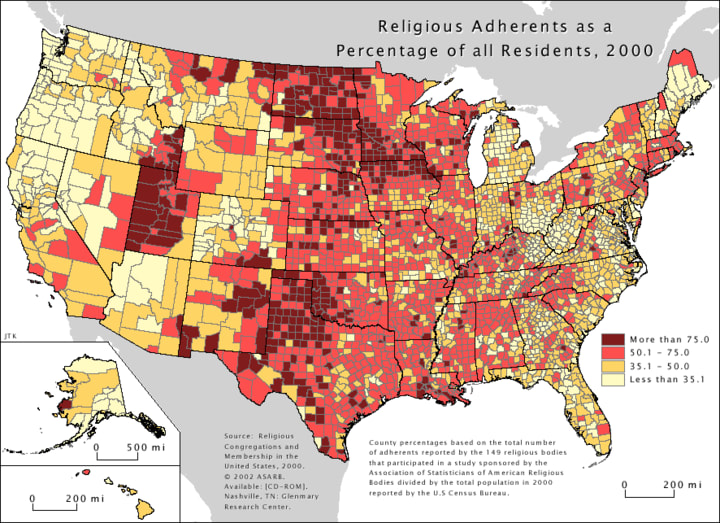Does Religion Affect Politics?
Does Religion Affect Politics & Why it Shouldn't

Religion. No doubt. No questioning.
Politics. Always Oppose. Always Question.
So why do these always seem to go together, why is it that many voters vote in favour of their religion rather than the policies. Why do Americans prefer a Christian, Jew, Sikh or Muslim to represent their state rather than an Athiest? If they do at all. Does a person of religion make a better politician?
Atheist Politicians
Not believing in any god has become quite common now in today's western society. So I'll name all of the self-admitted atheist politicians in the senate:
...
and done. That's right, there is no self-admitted atheist senator. Why because 3.1% of the American population are atheist.
PewResearchCentre did a poll on Religion in America - These are the results:
70.6% - Christian
- 25.4% Evangelical Protestant
- 14.7% mainline Protestant
- 6.5% Black Protestant - (Really - is America still segregated?)
- 20.8% Catholic
- 1.6% Mormon
- 0.8% Jehovah's Witnesses
- 0.5% Orthodox Christian
5.9% - Non-Christian Faith
- 1.9% Jewish
- 0.9% Muslim
- 0.7% Buddhist
- 0.7% Hindu
22.8% Unaffiliated
- 3.1% Athiest
- 4% Agnostic
- 15.8% "nothing in particular"
So this doesn't make sense if we were to take the senate as an accurate representation of religion in America then 3.1% of them should be an atheist. So let's take a look at the actual religious spread in the senate:
Of the 293 Republican elected to serve, all but two identify as Christians; the two senators that aren't Christian are Jewish.
Of the 242 Democrats elected to serve, 80% of them identify as Christian. However, there is slightly more religious diversity on this side of congress: 28 Jews, three Buddhists, three Hindus, two Muslims and one Unitarian Universalist (free to search for personal truths on issues). There are also a few 'Unaffiliated' senators - as if Athiest is a forbidden word in Congress.
America's Religious People - On a Map

Why are there no Atheists in the Senate?
The 'wisdom' of American politics has been for some time that you cannot enter the presidential office without being religious, more specifically, without being Christian. Most Americans have consistently said that it is important to them that the president has strong religious beliefs - PewResearchCentre Survey Data.
Being atheist seems to be a big liability in American politics, especially in a presidential race. In another PewResearch survey, the majority of Americans said that they would be lees likely to vote for a candidate if they didn't have a strong belief in God. Only 6% said they would be more likely to vote for a non-believer.
As you can see religion has a huge impact on your chances of being president. If you're Muslim 42% of the 2,000 people surveyed would say that they were less likely to vote for you, this is with Muslims being portrayed as terrorists in some (if not most) parts of America. Yet even higher than that, 51% would be less likely to vote for you if you were an atheist.
So why does being atheist kill your chance of being voted in as either president or senator?
Some responses by American voters highly imply that Americans reason (religious Americans) that if you are atheist then you do not have God on your side, therefore you will not have a successful run as president.
Currently, there have been no known atheists as president of the United States of America.
How do other countries fair with Religion in Politics?
In China, the situation lies in the complete opposite of America with there only being atheists in the Communist Party of China. The reasoning for this is most likely to do with Chinese Philosophy - Philosophers such as Xun Zi, Han Fei and Zhang Zai who all criticised religious practices during their times. The party also states that only atheists can take part in the parties politics. Here we see an oppression of religion in politics.
Britain, like America, is originally a Christian country when it comes to the last 1000 years. Yet here we do not see a situation like America. It seems with the British that people don't give a damn about religion (apart from Islam, but that is the same all of the western world with the rise of Islamaphobia). Religion and Atheism seem to be widespread in British politics. The Major of London is a Muslim, our current Prime Minister (Theresa May) is Christian, Alistar Campbell of the Labour Party famously declared that "we do not do God."
Is Religion Bad in Politics?
In my opinion, religion is bad in politics and corrupts and clouds judgement just as much as money. If removed I believe our leaders would be much more capable of making decisions as their religious views would not impair their judgement and would never outweigh the needs of the populace.
However, religion can be a good representation of the public's views: if your country is largely Christian then having a Christian president/prime minister would represent their populace. On the other hand, religion should never be the deciding factor when voting, the candidates' policies and secular views are more important than what God or prophet they believe in.
About the Creator
Cameron Puckey
Amateur Writer and Philosopher, travelling the world with my voice, mind and laptop.






Comments
There are no comments for this story
Be the first to respond and start the conversation.